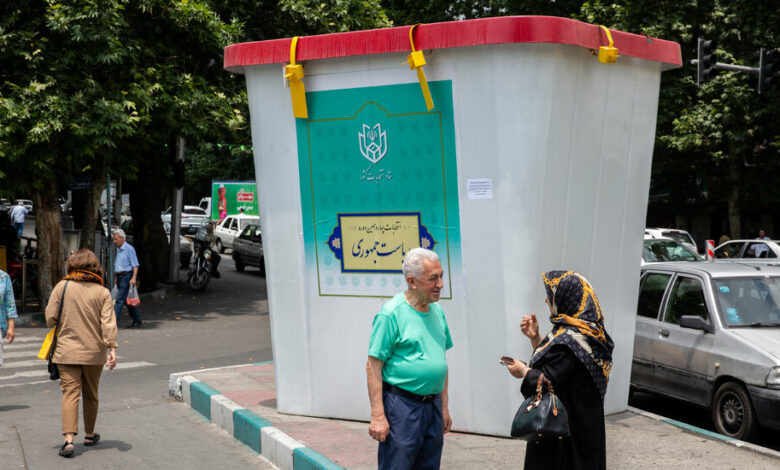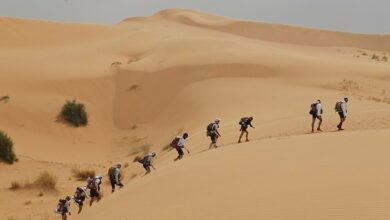Ahead of elections, Iranian voters say: ‘We have gone backwards’

Central Tehran is ablaze this week with posters and billboards for the six candidates in Friday’s presidential election, and the streets are packed with buses ferrying supporters to campaign rallies. Yet it’s hard to find enthusiasm for even one vote, let alone for an individual candidate.
Iranians are heading to the polls for special elections to choose the successor to former President Ebrahim Raisi, who died in a helicopter crash in May.
The elections come at a crucial time for Iran’s leadership. The economy has been crippled by years of sanctions, and under Mr Raisi’s ultraconservative leadership, personal freedoms and expressions of dissent have been increasingly crushed. Yet the government is eager to convince more Iranians to turn out in large numbers, because voter turnout is seen as a measure of its support and legitimacy.
It could be a challenge, after years of boycotts and voter apathy, and judging by a small sample of interviews in recent days. Conversations with more than a dozen government employees, students, businesspeople and other ordinary men and women revealed a level of fatigue, even skepticism, despite the risks of speaking out in Iran.
Even those who say they will vote – though they rarely say who they will vote for – say they have little confidence that their lives will change in ways that matter to them.
“We are going backwards and we are crying inside; I cannot afford to buy the machines I need for my work,” said Ibrahim, 53, an industrial engineer who owns a cement company in the northern city of Tabriz and who, like most Iranians interviewed in the days just before the election, was reluctant to give his full name for fear of retaliation by the authorities.
Iran’s economy has struggled in recent years, partly due to sanctions imposed by the United States after the collapse of the 2015 nuclear deal, but also because of economic mismanagement by the country’s clerical and military rulers. Iranians have also suffered from restrictions on their personal lives, especially the requirement for women to wear the hijab, which sparked mass protests in 2022.
They have heard presidential candidates’ promises of change from time to time, and they are hearing them again in the full voice of this election. But in the past, they have, at best, received some relaxation of laws on personal freedoms under moderate presidents like Hassan Rouhani or the reformer Mohammad Khatami, only to be dealt a harsh blow by their conservative successors, like Mr. Raisi.
And they know that the final say in all matters in Iran lies with the Supreme Leader, Ayatollah Ali Khamenei, and that they have no influence on his decisions.
Since the uprisings in both 2009 and 2010 over what were widely perceived as rigged elections, and the uprisings that were violently suppressed in 2022 with executions and imprisonment over the hijab, protests have taken different forms. One of these is to boycott the polls to demonstrate that the people reject any candidate allowed to run by the government, which vets all hopeful candidates.
This dissatisfaction with Iran’s current leaders surfaces in many conversations with ordinary Iranians, although older people like Ibrahim also gain some satisfaction from their experiences in the first years after the 1979 Iranian revolution.
Ibrahim was traveling with his family to the shrine south of Tehran, built in honor of Ayatollah Ruhollah Khomeini, the ideological architect of the revolution. This event was of great importance over the past 50 years and continues to influence Iran’s domestic and foreign affairs.
The enormous golden mausoleum, with its mosaic-covered domes and towering golden minarets visible from miles away, is a striking contrast to the deteriorating conditions in which so many Iranians say they find themselves today. Although I visited on a religious holiday, the huge complex and many parking spaces were virtually empty.
“I saw two generations: I was 7 years old when the revolution broke out, the generation of the revolution and the generation after,” he said.
“After the revolution we saw more sacrifice, and everyone thought they were brothers and sisters, and there was a philosophy of martyrdom, of anyone who was willing to give their life for the country,” he said, referring to the Iran conflict and Iraq. which ended in 1988 at the cost of hundreds of thousands of Iranian lives, although the actual number is unknown.
But now, if there is another war, “I don’t think they will fight for the country.”
His children, he said, wanted to leave Iran to study. His daughter, Faezeh, 21, who speaks English, was unequivocal: She wants to study artificial intelligence and engineering, and she said she could neither get the education she needs nor find a well-paying job after graduation if she lives in Iran Remained.
“I don’t think I have a good future here,” she said, adding that she wants to go to the University of Texas at Austin or Dallas. “We have a lot of resources and a lot of wealth in this country, oil and gas, but it doesn’t affect our lives.”
“We need more individual freedoms,” she added. Under Mr. Raisi, Iran intensified censorship and hampered the encryption of messaging apps. Many websites are now blocked in Iran and can only be reached via a virtual private network, or VPN
“I’m taking an artificial intelligence course on Coursera, and for that I need a VPN,” she said. “It has nothing to do with politics at all. Why is the government concerned?”
But will she vote in the elections? She shrugged and shook her head.
Many young people expressed similar sentiments. In the Tajrish Bazaar in northern Tehran, where many women let their scarves hang around their shoulders and only occasionally cover their heads, a brother and sister—he recently earned a pharmacy degree and she plans to get one herself—were window shopping together. They hesitated to talk about the election.
“You know, we don’t even want to talk about politics,” said 25-year-old Pedran, the pharmacist, who said he wasn’t voting “because we know we’ll be disappointed by all the political people.”
Would he leave Iran? “Maybe, but honestly it’s hard and our family is here.”
Those who feel most committed to voting are those who participated in the 1979 revolution, or at least have a childhood memory of it, and often have worked in government for a long time. They have often also fought in the war between Iran and Iraq, and they feel deeply connected to the country’s revolutionary identity.
Hossein Nasim, 56, who runs a small carpet shop in the Tajrish Bazaar, says he is excited about voting on Friday. He spent seven years as a prisoner in Iraq during the war – he became a soldier at 17 – and has one demand of the next president: keep Iran out of war.
“Keep us away from any kind of invasion,” he said, adding that the leaders of Iran’s Islamic Revolutionary Guard Corps are “peace-loving people” who try to avoid conflict. He said that Major General Qassim Suleimani, who led Iran’s powerful Quds Force, which is responsible for Iran’s external defense and whom the United States killed in a drone strike in Iraq in 2020, was the kind of leader “who could organize people very well.”
General Suleimani, who has been designated a terrorist by the United States, was responsible for setting up Iranian-backed armed groups in the Middle East that have helped achieve Mr. Nasim’s goal of keeping Iran out of war. These groups — Hezbollah in Lebanon, the Houthis in Yemen, Hamas in Gaza and various militias in Syria and Iraq — provide Iran with credible deniability while carrying out attacks on Iran’s enemies, including Israel and the United States.
Masumeh, 27, a conservatively dressed accountant in a black chador who had come with her 6-year-old son to pray at the shrine, seemed to be seeking the same sense of mission that both Mr. Nasim and Ibrahim, the industrial engineer, express Tabriz, drew from the early days of the revolution.
Speaking about Ayatollah Khomeini, she said: “I am too young to remember the revolution, but I know that many young people followed him and that he strengthened Islam in Iran.”
“This revolution was like a miracle for Iran. It made Iran exceptional, and we must continue on its path,” she said.




